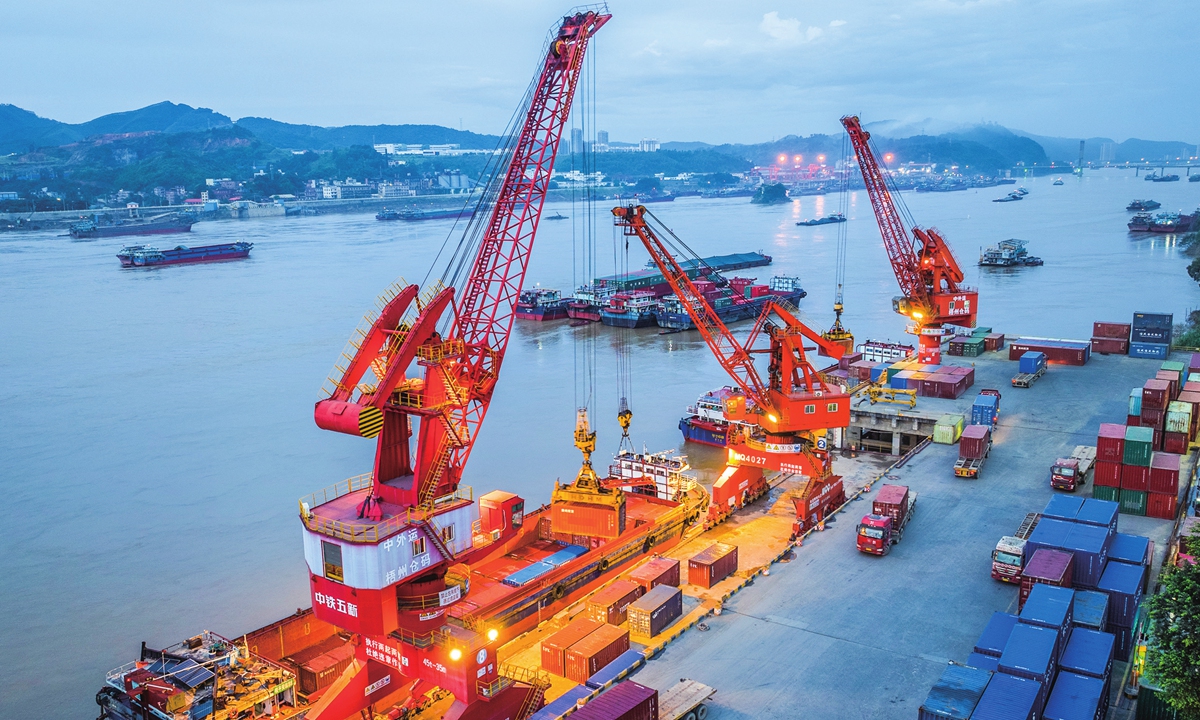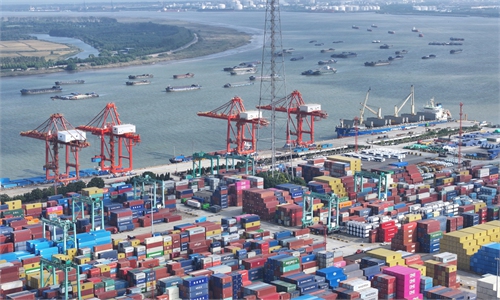China’s commerce ministry rolls out measures to support foreign trade
Support in insurance, financing, settlement for firms

Trucks shuttle back and forth in a container terminal in Wuzhou, South China's Guangxi Zhuang Autonomous Region on June 26, 2024. China's foreign trade in the first five months of 2024 recorded a yearly increase of 6.3 percent amid the country's steady economic recovery. Photo: cnsphoto
China's Ministry of Commerce (MOFCOM) on Thursday released a broader set of initiatives to support the stable growth of foreign trade in a bid to consolidate and strengthen the momentum of economic growth.
According to a notice published by the commerce ministry, nine measures were specified to boost foreign trade, involving support and guidance in insurance, financing, settlement, expanding scope on imports and exports, optimization of trade structure, visa facilitation and transportation.
"These measures aim to enhance the ability of Chinese export enterprises to cope with external market uncertainties to improve their competitiveness," Li Yong, a senior research fellow at the China Association of International Trade, told the Global Times on Thursday.
The support measures will provide enterprises with a better domestic policy and market environment to explore overseas markets, Li noted.
Aimed at facilitating cross-border business exchanges, MOFCOM said the measures will steadily advance the signing of visa-free agreements with more countries, expand the scope of countries eligible for China's unilateral visa-free policy in an orderly way, broaden areas where the transit visa-free policy applies, and extend the allowable stay duration.
Boosting e-commerce development was also among the measures released on Thursday, with continued promotion in the construction of overseas smart logistics platforms and cross-border e-commerce service platforms. The MOFCOM measures will provide enterprises with overseas legal and tax resources and other services.
"The measures are more targeted and practical for export enterprises, especially for e-commerce enterprises," Zhu Qiucheng, CEO of Ningbo New Oriental Electric Industrial Development, told the Global Times.
Zhu noted that logistics and compliance are currently the biggest pain points for enterprises engaged in cross-border e-commerce. The construction of overseas intelligent logistics platforms will help solve the problem of high transportation and storage costs, as well as uncertainties.
"We also expect more policy support in the e-commerce sector in the next 5-10 years," Zhu said.
Under the section devoted to expanding specialty agricultural products and other commodities exports, MOFCOM said that it will guide and help enterprises actively respond to unreasonable foreign trade restrictions and create a good external environment for exports.
"The guideline showcases policymakers' clarity on the current international trade situation and potential challenges," Li said, noting that preparations should be made to encounter potential risks.
Apart from support for exports, MOFCOM said that it will support imports of key equipment, energy and other products, while expanding the imports of renewable resources.
The raft of policy measures aimed at promoting the steady growth of foreign trade was deliberated and adopted by a State Council executive meeting on November 8.
The meeting called for solid work in promoting the steady growth of foreign trade to provide strong support to the economy's continuous recovery, specifying a slew of work arrangements, including beefing up financial support, fully utilizing policy support loans for small- and micro-sized businesses, and optimizing cross-border trade settlement to help enterprises strengthen their capacity in managing exchange rate risks, the Xinhua News Agency reported.


